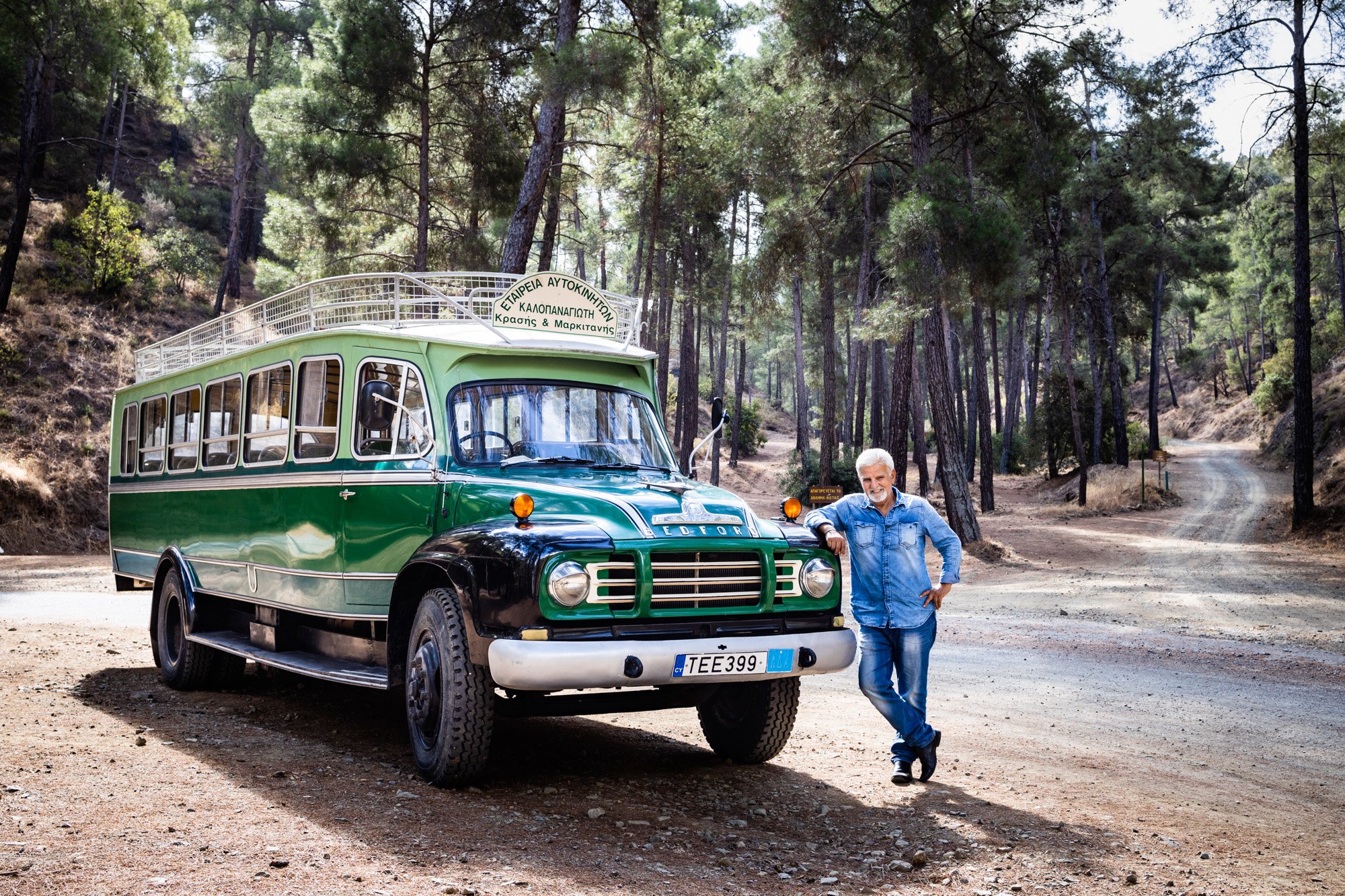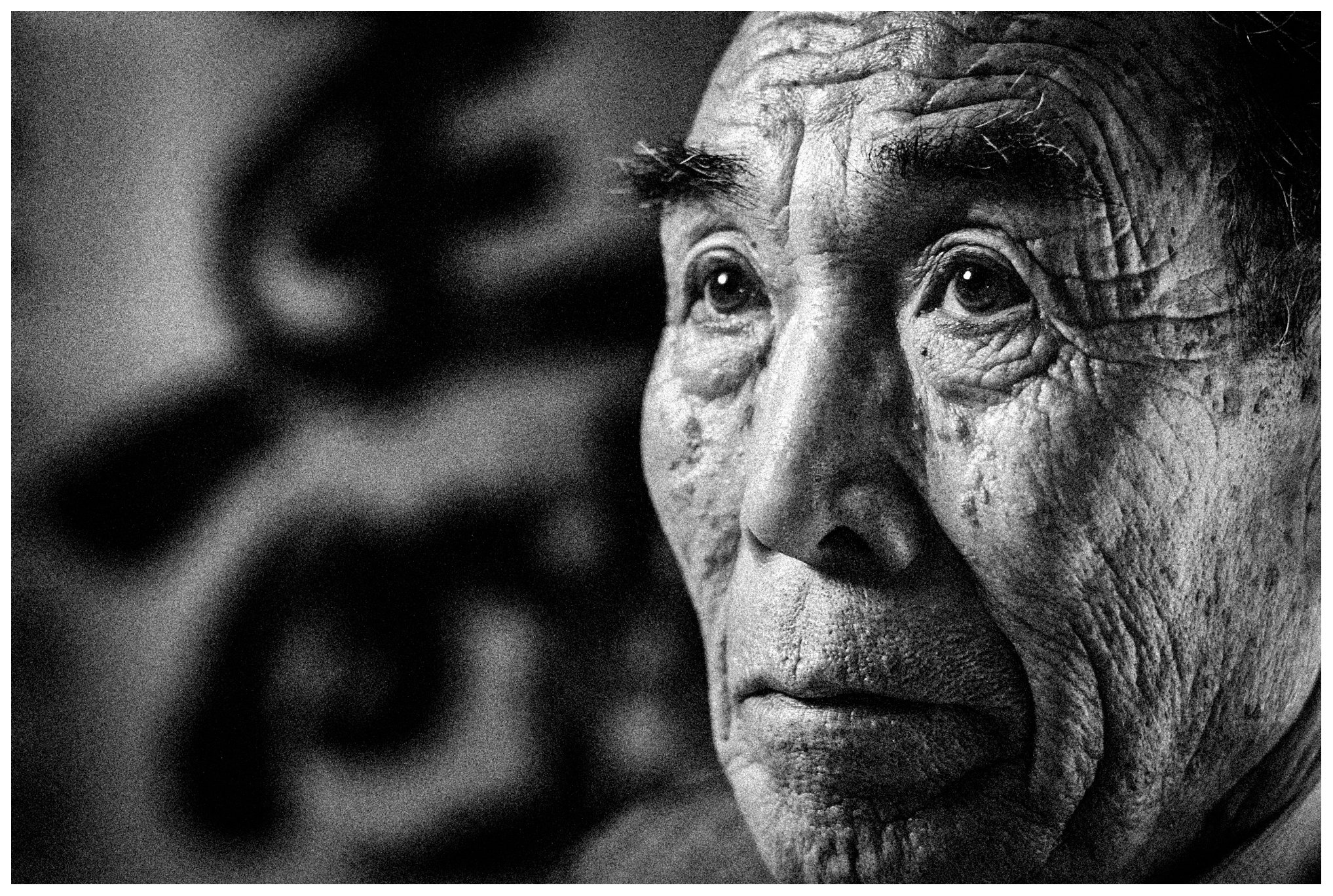
Vignettes
Insights and encounters
Old life renewed
Below: Celebrating a more traditional way of life, Gigis and Sotiris chat over the final olive harvest of the year. The olives will go to Casale Panayiotis, a hotel and spa that sources most of its produce from local growers, breathing new life into the community.
Above: Andros drives the old village bus that was lovingly restored by the hotel’s owners. The bus is used to take guests on local tours, visiting beauty spots and businesses producing local products.
Casale Panayiotis, Troodos mountains, Cyprus.
Photos: © Marcus Perkins
With Tom Price and Aaron Koch
The eliminator
Dumila has been a healthcare professional for nearly 40 years, and the coordinator for the elimination of neglected tropical diseases since 2012. He operates in Lamu, Kenya’s most northerly coastal county bordering Somalia – an area some choose to avoid.
Neglected tropical diseases are disproportionately suffered by the poor, a point Dumila is acutely aware of. Poverty and injustice anger him, and his understanding of the challenges many face seems to drive him on. To witness Dumila operate in his community is to understand how deeply he cares. It also explains the depth of respect he receives from the people he serves.
Lamu, Coastal Region, Kenya.
Photo © Marcus Perkins
Activist mum
Proud mum Gertrude Usaiwevhu with her son Munyaradzi. Gertrude is the leader of a group of volunteers who provide support to more than 500 orphaned children in her area.
“We visit all the villages, monitoring child-headed households, looking out for newly-orphaned children and watching for abuse or exploitation, which is common. The biggest challenge we face is identifying sources of food and school fees for these orphans because so many do not have any work or money.”
Sirewe village, Zimbabwe.
Photo: © Marcus Perkins
Silent help
Disco enthusiasts dance on the streets of London, led by a walking DJ and organised by CHILD.ORG. The popular ‘Silent Disco’ activity was added to AirBnb Experiences in London, with the profits going to CHILD, the children’s health charity headquartered in Bristol.
Southbank, London.
Photo © Marcus Perkins
In memory of Dara
Dara (Rachelle Dyanne 'Dara’ Bascara) was a model and a fiercely dedicated human rights activist who fought tirelessly to protect the rights of filipinos in the UK and overseas. Along with her campaigning and academic research into the psychology of oppression, she also involved herself in helping and encouraging her community during the toughest of times.
During the Covid pandemic, she delivered food by bike to filipinos who had become isolated after losing their jobs and were unable to return home. Earlier in 2013 and 2014 she campaigned for months to help communities in the Philippines rebuild their lives after swathes of the country had been shattered by Typhoon Haiyan.
On her journey to academia, those around her were quietly proud when in 2020, she finally completed her PhD thesis; Towards a Unified Theory of Oppression.
So it was terribly sad to learn that Dara’s life had been tragically cut short in March of 2021. Dara will surely be missed by the people she worked with, and by the people she committed herself to defend.
Photos © Marcus Perkins
With Nick Havas and Sarah Tabea Meier - Hoevermann.
Note: These photos have been made available online for Dara’s family and friends to find and download for personal use. No further permission is required.
Community spirit
Charles Banya on the day he walked out of the bush and into a rehabilitation camp. He had escaped the ranks of the LRA, a brutal military group that had terrorised communities across Northern Uganda for more than 20 years.
Despite the atrocities carried out by the LRA, it was common for those who managed to escape its clutches to be accepted back into their communities. The reason, it was explained, was because local people understood that many of the rebels were themselves victims. Almost all of them abducted, many as children, then brutalised and conditioned to suit the twisted needs of Joseph Kony, the fugitive LRA leader.
Whilst communities in the region did their best to welcome and reintegrate former rebels, rehabilitation programmes to assist with the process were poorly funded. It seems NGOs find it far easier to raise funds for babies and children, leaving adults, and particularly men, without the support they so often need.
Gulu, Northern Uganda.
Photo © Marcus Perkins
Behind the gun
Hassan Mohammed (back right) used to be a cook, but now works as an armed guard protecting development projects and community leaders. He is one of the millions who carries a gun in Somalia, but is also one of many who wished it wasn’t necessary. Hassan has never had to shoot anyone, but he did once arrest a man to bring him before the elders for justice.
We were invited to see one of the temporary feeding centres in Bu’aale that Hassan was assigned to protect, set up to help families cope with the effects of famine. They were serving a mixture of maize, cowpea (a kind of bean), sugar, sesame oil and powdered milk, but unfortunately there wasn’t enough for everybody.
Bu’aale, Somalia.
Photo © Marcus Perkins
Cursed resources
A pygmy elder stands with his community in the safety of the Eringeti displacement camp. He had led them through 60 miles of dense jungle to escape the murderous gangs rampaging in their area. Many thousands had fled the violence in north east Congo where abundant natural resources are the cause of seemingly endless conflict.
The indigenous pygmies are believed to be the original inhabitants of the Congo, but are increasingly at risk. Often caught in the crossfire between competing militias, the pygmies are being driven ever further from their traditional foraging and hunting grounds, destroying their way of life.
Eringeti, north east region, DR Congo.
Photo © Marcus Perkins
Forever stuck at 3:26pm
Ace Japanese fighter pilot, Kaname Harada, fought in many of the major aerial campaigns during WW2, including Pearl Harbor and the Battle of Midway. He still has the watch given to him by the Emperor for his flying skills, forever stuck at 3:26pm – the moment he ditched into the sea when his carrier, Soryu, was sunk by the Americans. After the war, Harada eventually became a local kindergarten teacher and tirelessly devoted his life to peace, education and reconciliation until his death in 2016 aged 99.
Nagano, Japan.
Photo © Marcus Perkins
Dry season
Salome and Mercy (7 and 8) show how they wash without getting into the water. They do this to reduce exposure to a waterborne parasitic infection called schistosomiasis, which affects communities in areas where access to clean water is a challenge.
Fortunately, it is the dry season so infection rates are very low because snails, the vector for schistosomiasis, are rare in summer. However, children generally are more at risk of infection because they typically spend more time around water playing with friends.
The fathers of the girls said they were grateful for the initiative to eliminate schistosomiasis, a programme spearheaded by the World Health Organization. Peter Gande, Mercy’s father, said ‘I would like that we remove this disease. We suffer from it and it affects us’.
The picture was taken in Kenya, one of the countries that has made significant gains in the fight against neglected tropical diseases. The photography, which was endorsed by local communities and supported by the Kenyan Ministry of health, is helping to illustrate different aspects of the World Health Organization’s campaign to eliminate schistosomiasis as a public health concern.
Bofu Kombeni village, Kilifi, Kenya.
Photo © Marcus Perkins for Merck KGaA









